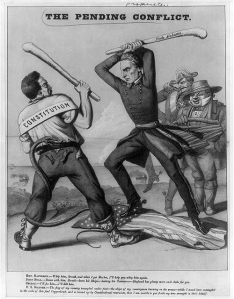It’s a wonderful town! I’m looking forward to my trip to New York, as I haven’t been there in thirteen years.
Tell me what you think: Frank Sinatra or Gene Kelly? I’m a Kelly girl, myself. (We’ll just leave the unfortunate Jules Munchin out of this contest.)
See you at NYU next Tuesday for lunch, and at the Columbia Early American seminar that evening. I’m very much looking forward to my visit, which was coordinated by Zara Anishanslan at the College of Staten Island, Eric Herschthal at Columbia, and Nicole Eustace at NYU. (Eric has been writing for Slate lately–have you seen his latest on Governor Dunmore’s Ethiopian Regiment? I especially liked his commentary this summer about why popular histories of the American Revolution ignore the current scholarship. He writes:
These pop histories make arguments I haven’t seen scholars of the Revolution make in years. Continue reading




